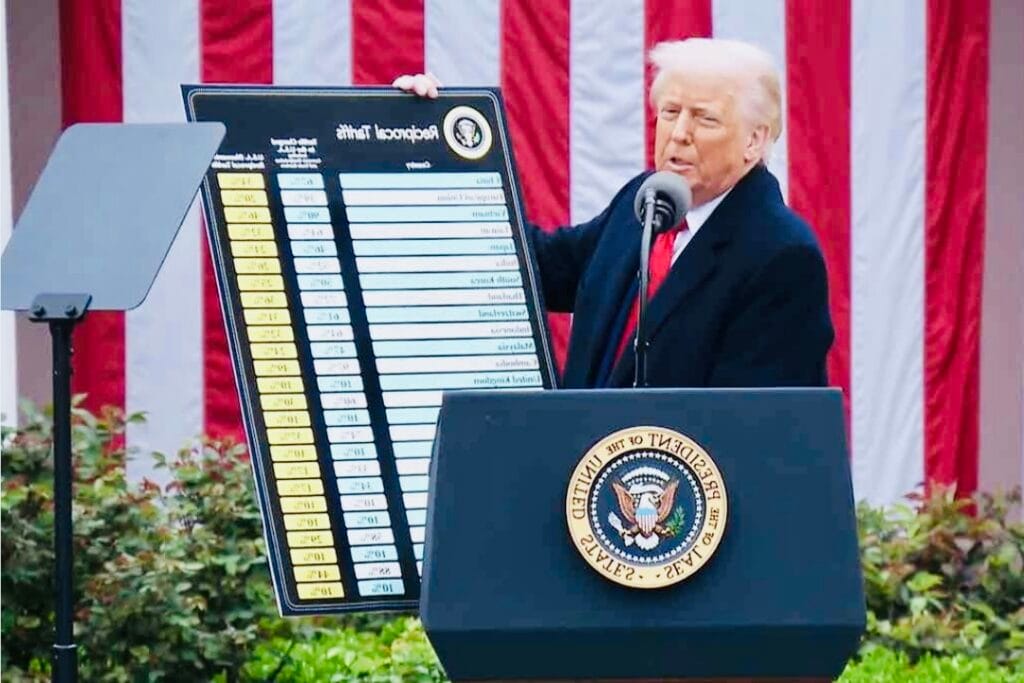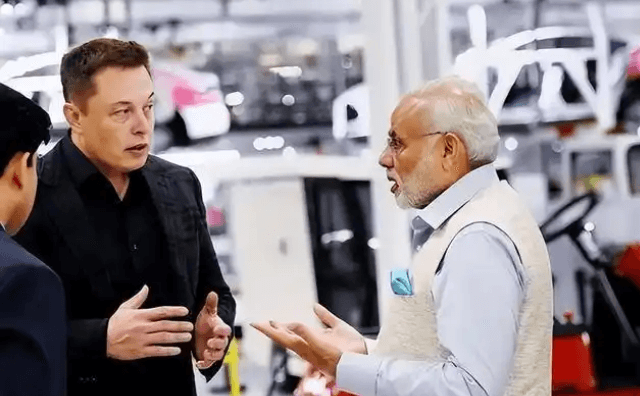On the 12th, Eastern Time, the US side announced a relevant memorandum, exempting some products such as computers, smart phones, semiconductor manufacturing equipment, and integrated circuits from “reciprocal tariffs.”

Some financial analysts said that this marks a 180-degree turn by the US government on its tariff policy. This move is beneficial to electronic giants such as Apple and American consumers, and its purpose is obviously to save the market.
However, for people who have long been accustomed to the US’s tariff “random punch”, it is really hard to say whether such a turn is a flash in the pan or a permanent change.
“The principle of ‘always changing’ is as solid as a rock”
The Trump administration recently introduced the so-called “reciprocal tariffs”, which caused major fluctuations in global financial markets, including the United States, and drew unanimous condemnation from the international community.
According to the relevant presidential decree, dozens of trading partners that are said to have trade surpluses with the United States will be subject to “reciprocal tariffs” ranging from 11% to 50%; and even more partners that do not have trade surpluses with the United States will be subject to a “minimum benchmark tariff” of 10%.
But like many of the tariffs previously proposed by Trump, the “reciprocal tariffs” have also experienced unpredictable changes: just 13 hours after they came into effect, Trump announced a 90-day suspension of “reciprocal tariffs” on some countries because the market was hit too hard, but said that during this period, these countries would still have to bear the “minimum benchmark tariffs.”
Trump Reverses Course on Global Tariffs, Announcing 90-Day Pause
Regarding this “fickleness”, Colbert, the host of the famous American talk show “The Late Show with KO” joked, “I have no idea what Trump wants to do on the issue of tariffs. On this point, I obviously have something in common with Trump.”
In addition to complaining about the confusion of tariff policies, Colbert also satirized Trump’s self-contradiction: “Obviously, his policies have changed, and he said before, ‘My policies will never change.’ But it’s true that his policies are ‘always changing’. This one is indeed as solid as a rock, at least for now.”

Compared with the ever-changing tariff rhetoric, the absurdity of “reciprocal tariffs” itself has become the target of international public opinion.
On the one hand, the so-called “reciprocal tariffs” are actually not reciprocal at all.
The WTO has never required all parties to have completely consistent tariffs. Instead, it has clearly stipulated that developed countries should not require developing countries to make tariff concessions that are inconsistent with their development, financial and trade needs. In other words, “non-full reciprocity” between developed and developing countries is an important principle of negotiations under the multilateral trading system.
However, the US government has switched concepts and practiced trade protectionism in the name of maintaining “reciprocity”, seriously violating the most basic and core rules of the WTO, such as most-favored-nation treatment, non-discrimination, and bound tariffs, impacting the international economic and trade order and casting a shadow on the development of global trade.
On the other hand, the Trump administration’s “reciprocal tariff” rates on various countries are calculated using a simple and crude formula: a country’s trade surplus with the United States divided by its total exports to the United States and then divided by 2. This has led to the absurd situation where Lesotho, one of the poorest countries, was subject to the highest “reciprocal tariff” of 50%.

India’s Economic Times: Trump’s tariff policy is a “disaster” for the world’s poorest countries
As ridiculous as this is, there is no intention that the “reciprocal tariffs” will be cancelled after the suspension.
Trump said on the 10th that he would not extend the suspension period. If the relevant countries cannot reach an agreement with the United States within 90 days of the United States suspending “reciprocal tariffs”, he will restore this tariff policy when the deadline expires.
“Start the fire first, then consider the consequences”
The U.S. government’s erratic tariff policy has not only been criticized by the world, but has even led to divisions within the Republican Party and open hostility among U.S. business leaders who support Trump.
The New York Times commented that the reckless style of “starting a fire first and considering the consequences later” is the most prominent feature of Trump’s tariff policy. Disrupting the global trade system is just another example of the Trump administration “destroying something and later revealing that there is no alternative.”
“Beyond endless threats and negotiations, (Trump administration) officials have yet to explain how to navigate an extremely complex global system after the initial shock wears off.”

Regarding the US decision to suspend the imposition of “reciprocal tariffs” for 90 days, German Chancellor-designate Merz “reminded” in an interview a few days ago that Trump’s unpredictability has brought “the greatest uncertainty” to the United States itself, which has also caused Trump to face a lot of criticism from his own party and the business community.
French President Emmanuel Macron said on social media that the “fragile suspension” did not solve the fundamental problem. “The 90-day suspension brings uncertainty, which has brought economic pressure to transatlantic companies.”

Media and experts from many countries said that the huge uncertainty created by the US “tariff chaos” is itself affecting corporate decision-making, undermining market confidence and causing harm to the global economy.
The Wall Street Journal wrote that the “pause” is not the end of the tariff chaos. No one knows Trump’s true intentions, not even Trump himself.
The article points out that for American companies, “pause” means more uncertainty, especially it means that investments that are crucial to economic growth will continue to be delayed; for American consumers, life will still be difficult because tariffs have already hit prices.

Ian Bremmer, founder and president of the U.S. political risk consulting firm Eurasia Group, said that the speed and volatility of Trump’s tariff policy have caused extremely serious global economic turmoil, which has also turned the United States from the country with the best economic situation in the G7 at the beginning of this year to the current “number one destroyer” of the global economy.

Jason Furman, a professor at Harvard University and former chairman of the White House Council of Economic Advisers, published an article in the Financial Times, emphasizing that even if Trump is ultimately able to make some kind of “concessions,” he will “successfully create uncertainty,” which in itself is a tariff that will continue to affect corporate decisions and undermine market confidence.
The article metaphorically says that this is like “letting the evil genie out of the bottle, and it will be difficult to put it back in the bottle.”



